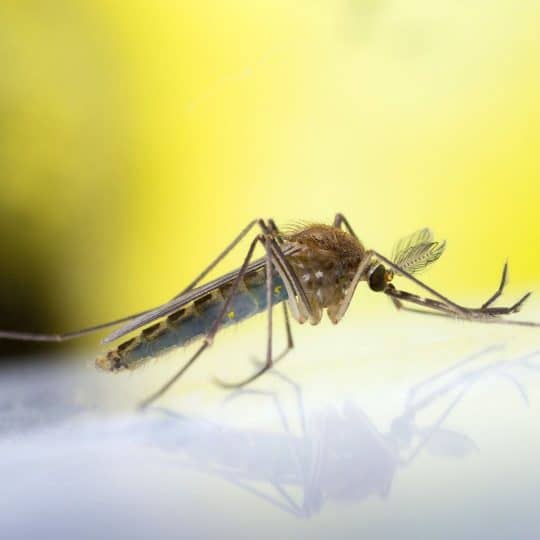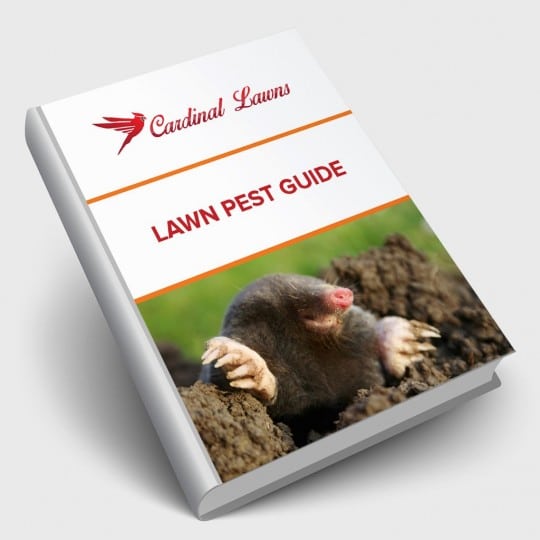7 Summer Lawn Pests
How to Prevent & Control Them
Posted
June 8, 2023

Summer is the season when kids are out of school, families go out of town, and lawn pests are out in droves. Take a look at this list of seasonal intruders and find out what you can do to help prevent and/or treat them.
Preventing Summer Lawn Pests
If you’re planning on hosting a summer backyard BBQ, pool party, or other get-together, you may have some uninvited guests. There are a number of lawn pests that would be more than happy to dine with you—and on you. Don’t give them the chance.
One of the best ways to prevent any pests from venturing into your lawn is to properly maintain your grass and plants. Pests prefer to hide in tall grass, overgrown shrubs, wooded areas, and any other unkempt, neglected areas where they won’t be disturbed. However, if you regularly mow your lawn, trim your plants, remove lawn debris, and keep wood piles away from your home, you’ll be making your yard less desirable for pests and more desirable for you.
There are some pests that could still find their way onto your property no matter what you do. For instance, some ticks travel by deer and spotted lanternflies may be attracted to your trees. If you do find certain summer lawn pests are still hanging out by your hammock, there are other methods to try.
Spotted Lanternfly Control
This invasive pest has been spotted on the east coast for years now. The nymphs feed on vines, pines, and a variety of trees, while the adult prefers what’s known as the tree of heaven. At first, you may notice their cluster of eggs—a dark mass of a mud-like substance on tree bark or siding. Once they hatch in late spring you’ll see young lanternflies—dark in color with white spots—before they grow into a moth-like insect with red wings. As you approach, you may notice them leap around your lawn. You’ll want to control the population before they mate and lay eggs in late summer. These egg masses survive the winter to repeat the process next year.
You can stop the spread by locating and removing the egg masses on any outdoor surface. Scrape the mass off into a sealable bag and dose them in alcohol to kill them before disposing. High risk trees can be protected with specially designed bands that capture the lanternfly. Certain insecticides also work to control this pest.
Flea & Tick Control
If you have pets, you’re already taking some precautions against fleas and ticks. But you could be doing more to help prevent the pests from invading your yard. Both of these pests are tiny blood-sucking insects that jump around and can transmit disease. Flea bites are itchy and can leave red bites around your ankles. Ticks may not be noticeable until they’ve already latched on to a host and fatten after feeding. To make your yard less desirable to these pests:
- Keep bushes, trees, and grass trim
- Dethatch your yard
- Remove debris
- Don’t overwater
- Use cedar mulch or gravel as a barrier around your lawn.
Carefully remove any ticks you find on yourself or pets and seek medical attention if you notice any symptoms post bite.
Ant Control
Dealing with ants is no picnic, especially if they’re the type that bite or eat through wood. There are the common ants you’ll find making mounds around your garden or marching through your home. Then there are the carpenter ants that burrow in tree bark and other wooden structures. Even though they’re all part of the ant family, some do more damage than others and should be treated differently.
For multiple mounds popping up around your yard, you can soak the hill with a hose or use a mixture of boiling water, soap, and vinegar to wash them out. For larger infestations in your home, there are specially formulated pest control products that are safer to use around your family and food. If you’re dealing with biting fire ants or burrowing carpenter ants, contact a professional pest control company to deal with the problem properly.
Grub & Beetle Control
Grubs are plump, white, caterpillar-like creatures that start by eating grass roots and creating dead spots in your lawn and garden. They also grow into beetles that will grow to finish off your plants above the surface. A few grubs could be helpful if you have a lot of thatch, but you could also get rid of the thatch yourself and not have to deal with a larger grub or beetle problem in the future.
You can help prevent grubs, and eventually beetles, from destroying your lawn by growing drought-resistant grass that doesn’t need to be watered as frequently. Encourage healthy root growth by fertilizing in the fall. Any preventative pesticides should be used early in the summer, but only if the problem is beyond preventative measures.
Mosquito Control
We can’t talk about summer without mentioning one of the worst warm weather pests. Not only do they buzz and bite, but mosquitoes can also carry disease. Areas known for large infestations may have a local control program that help prevent larvae and adults in and around your home. There are still steps you can take to support these efforts.
- Remove areas that accumulate standing water
- Tightly cover water storage containers
- Regularly scrub any containers that hold water, indoors or out
- Secure and repair window and door screens
- Don’t leave exterior doors propped open
- Use mosquito repellent sprays
If the problem persists and you don’t have a local control program, contact a professional pest control company for assistance.
Professional Summer Lawn Pest Control
Since it’s summer, you want to enjoy your time outdoors or find an escape from the heat inside. Make sure these areas are free of pests to make the moment more enjoyable. Contact Cardinal Lawns for help preventing and treating the wide range of lawn pests that are also active this season. With experts on your side, there’s less time worrying and more time welcoming the warmth.

Download Your FREE Lawn Pest Guide
Pests become most prevalent during the heat and humidity of summer. Take some time to learn about the signs of infestations before any damage can be caused to your landscape. This handy guide will teach you how to spot common lawn pests and how to keep them from causing harm to you and your property.